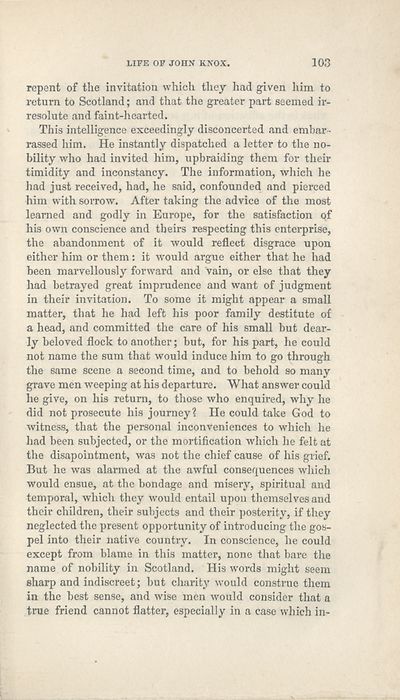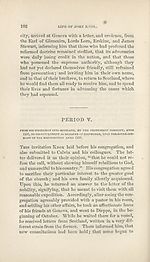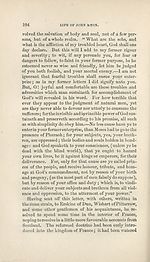Download files
Complete book:
Individual page:
Thumbnail gallery: Grid view | List view

JOHN KNOX.
103
repent of the invitation which they had given him to
return to Scotland; and that the greater part seemed ir¬
resolute and faint-hearted.
This intelligence exceedingly disconcerted and embar ¬
rassed him. He instantly dispatched a letter to the no¬
bility who had invited him, upbraiding them for their
timidity and inconstancy. The information, which he
had just received, had, he said, confounded and pierced
him with sorrow. After taking the advice of the most
learned and godly in Europe, for the satisfaction of
his own conscience and theirs respecting this enterprise,
the abandonment of it would reflect disgrace upon
either him or them: it would argue either that he had
been marvellously forward and vain, or else that they
had betrayed great imprudence and want of judgment
in their invitation. To some it might appear a small
matter, that he had left his poor family destitute of
a head, and committed the care of his small but dear¬
ly beloved flock to another; but, for his part, he could
not name the sum that would induce him to go through
the same scene a second time, and to behold so many
grave men weeping at his departure. What answer could
he give, on his return, to those who enquired, why he
did not prosecute his journey? He could take God to
witness, that the personal inconveniences to which he
had been subjected, or the mortification which he felt at
the disapointment, was not the chief cause of his grief.
But he was alarmed at the awful consequences which
would ensue, at the bondage and misery, spiritual and
temporal, which they would entail upon themselves and
their children, their subjects and their posterity, if they
neglected the present opportunity of introducing the gos¬
pel into their native country. In conscience, he could
except from blame in this matter, none that bare the
name of nobility in Scotland. His words might seem
sharp and indiscreet; but charity would construe them
in the best sense, and wise men would consider that a
true friend cannot flatter, especially in a case which in-
103
repent of the invitation which they had given him to
return to Scotland; and that the greater part seemed ir¬
resolute and faint-hearted.
This intelligence exceedingly disconcerted and embar ¬
rassed him. He instantly dispatched a letter to the no¬
bility who had invited him, upbraiding them for their
timidity and inconstancy. The information, which he
had just received, had, he said, confounded and pierced
him with sorrow. After taking the advice of the most
learned and godly in Europe, for the satisfaction of
his own conscience and theirs respecting this enterprise,
the abandonment of it would reflect disgrace upon
either him or them: it would argue either that he had
been marvellously forward and vain, or else that they
had betrayed great imprudence and want of judgment
in their invitation. To some it might appear a small
matter, that he had left his poor family destitute of
a head, and committed the care of his small but dear¬
ly beloved flock to another; but, for his part, he could
not name the sum that would induce him to go through
the same scene a second time, and to behold so many
grave men weeping at his departure. What answer could
he give, on his return, to those who enquired, why he
did not prosecute his journey? He could take God to
witness, that the personal inconveniences to which he
had been subjected, or the mortification which he felt at
the disapointment, was not the chief cause of his grief.
But he was alarmed at the awful consequences which
would ensue, at the bondage and misery, spiritual and
temporal, which they would entail upon themselves and
their children, their subjects and their posterity, if they
neglected the present opportunity of introducing the gos¬
pel into their native country. In conscience, he could
except from blame in this matter, none that bare the
name of nobility in Scotland. His words might seem
sharp and indiscreet; but charity would construe them
in the best sense, and wise men would consider that a
true friend cannot flatter, especially in a case which in-
Set display mode to:
![]() Universal Viewer |
Universal Viewer | ![]() Mirador |
Large image | Transcription
Mirador |
Large image | Transcription
| Antiquarian books of Scotland > Scotland/Scots > Life of John Knox ; and, The life of Alexander Henderson > (121) |
|---|
| Permanent URL | https://digital.nls.uk/131833756 |
|---|
| Description | Thousands of printed books from the Antiquarian Books of Scotland collection which dates from 1641 to the 1980s. The collection consists of 14,800 books which were published in Scotland or have a Scottish connection, e.g. through the author, printer or owner. Subjects covered include sport, education, diseases, adventure, occupations, Jacobites, politics and religion. Among the 29 languages represented are English, Gaelic, Italian, French, Russian and Swedish. |
|---|

